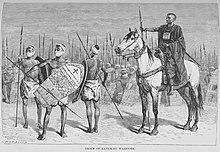Kanuri (people)
Kanuri ( Hausa -name Beriberi ) is a people in the central Sudan zone and on Lake Chad . They see themselves as the state people of the old Bornu Empire ( Kanem-Bornu ). The Kanuri have been Muslims since the 11th century . The Kanuri language is spoken by about four million.
The Kanuri make up the vast majority of the members of Boko Haram .
The Kanembu are a subgroup of the Kanuri .
history
Legends of the Kanuri lead back the origin of their kingdom Bornu (Kanem-Bornu) to the area north and northeast around Lake Chad. Some traditions suggest the origin (like many of the Muslim ethnic groups in western Sudan) in Yemen . The old Kanem Bornu empire, which arose around 800 AD in the Lake Chad region, had its first peak in the 12th to 13th centuries.
The continued existence of the Kanuri in the oases in the northern area is characterized above all by economic motivation, it secured the caravan trade and important trade routes to the Mediterranean.
language
Kanuri is one of the most important languages in West Africa . It is spoken by more than four million people in the region around Lake Chad. Most of the speakers live in Borno in northeastern Nigeria and in the eastern areas of Niger . Kanuri forms together with Teda-Daza and Zaghawa (and the extinct Berti) the Saharan language group of Nilo-Saharan .
Kanuri is also spoken in the oases of Bilma and Fachi (Niger) and occasionally in the extreme south of Fessan ( Libya ). In the important Kanem-Borno Empire, Kanuri was the state-supporting means of communication. In Nigeria, Kanuri has official status as the regional language of instruction and is also used as a medium in radio and television.
Social organization
Research by Ronald Cohen and Editha Platte is available on the social organization of the Kanuri. In his book Fachi (1989), Peter Fuchs deals with the Sahara Kanuri, who live in the Fachi and Bilma oases and which differ considerably from the main group of Kanuri, whose ethnic center south of the Sahara lies in the core area of the historical Kanem Bornu Empire .
Due to the fact that many Kanuri are Muslim, there is an ideal (mainly of men) of a relationship between man and woman, which sees the husband as head of the family, while the woman, in the ideal, as hardworking, loyal, tender and cautious. In everyday life, however, such typification is not so visible.
Peter Fuchs comments: “Although these roles are externally determined by convention, gender division of labor and religion, for internal cohesion, for harmony or disharmony and, last but not least, for the status of the individual in this marriage, the decisive factors are cleverness and cunning, self-control and love. "The one who loves more is always the weaker one in marriage," one says in Fachi and one could conclude from this that in Fachi the love of men for their wives is generally greater than the other way around. "
religion
The Kanuri were Islamized around the 11th century, which manifests itself strongly in their daily life. The visible elements of religious practice include public prayers, religious festivals, daily prayers and regular readings of the Koran . Nevertheless, there are individual points that cannot be attributed to Islam and are viewed as unorthodox.
Known Kanuri
- Grémah Boucar (* 1959), Nigerien journalist, media entrepreneur and politician
- Aïchatou Boulama Kané (* 1955), Nigerien politician
- Mamadou Dagra (* 1953), Nigerien lawyer and politician
- Mamane Oumarou (* 1945), Nigerien politician and diplomat
- presumably: Angelo Soliman (around 1721–1796), valet, prince tutor to Hereditary Prince Alois I of Liechtenstein and freemason
literature
- Ronald Cohen: The Kanuri of Bornu . Holt, Rinehart and Winston, New York 1967.
- Norbert Cyffer : English - Kanuri Dictionary . Rüdiger Köppe, Cologne 1994.
- Peter Fuchs: The bread of the desert. Socio-economy of the Sahara Kanuri by Fachi . Steiner, Wiesbaden 1983, ISBN 3-515-03764-0 (= Studies in Cultural Studies , Volume 67).
- Peter Fuchs: Fachi. Sahara city of the Kanuri . Steiner, Stuttgart 1989, ISBN 3-515-05003-5 (= studies on cultural studies , volume 90).
- Dierk Lange: "Ethnogenesis from within the Chadic state". In: Paideuma No. 39, 1993, pp. 261-277 ( online version ; PDF; 665 kB).
- Gustav Nachtigal : Sahara and Sudan , Volume 2, Leipzig 1881 ( The population of Bornu , pp. 415–448).
- Editha Platte: Women in Office and Dignities. Scope of action for Muslim women in rural northern Nigeria . Brandes and Apsel, Frankfurt am Main 2000, ISBN 3-86099-296-1 (also dissertation at the University of Frankfurt am Main 1998).
Web links
Individual evidence
- ^ Meyers Online Lexicon .
- ^ Adam Higazi: Les origines et la transformation de l'insurrection de Boko Haram dans le Nord du Nigeria . In: Vincent Bonnecase (ed.): Crises et chuchotements au Sahel . Éditions Karthala, Paris 2013. ISBN 978-2-8111-0990-5 (= Politique Africaine, ISSN 0244-7827 , no. 130). Pp. 137-164, here pp. 148-150.
- ^ Ronald Cohen: The Kanuri of Bornu . Holt, Rinehart and Winston, New York 1967, p. 12.
- ^ Norbert Cyffer: English - Kanuri Dictionary . Rüdiger Köppe, Cologne 1994.
- ^ Peter Fuchs: Fachi. Sahara city of the Kanuri . Vol. 2, Franz Steiner, Stuttgart 1989, p. 16.
- ^ Peter Fuchs: Fachi. Sahara city of the Kanuri . Vol. 2, Franz Steiner, Stuttgart 1989, p. 277 ff.
- ^ Peter Fuchs: Fachi. Sahara city of the Kanuri . Vol. 2, Franz Steiner, Stuttgart 1989, p. 279.
- ^ Peter Fuchs: Fachi. Sahara city of the Kanuri . Vol. 2, Franz Steiner, Stuttgart 1989, p. 152.
- ↑ Kanuri Religion on Countries and Their Cultures website, accessed November 28, 2008.

